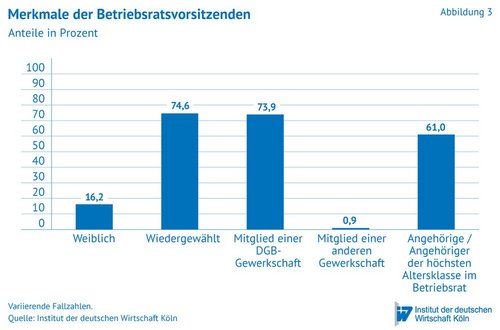A Review Based on the IW Works Council Election Survey

Works Council Elections in 2014
IW-Trends

A Review Based on the IW Works Council Election Survey
Elected works councils are a central feature of industrial relations in this country. Held every four years between March and May, the most recent round of elections was in 2014. In those companies with a works council the 2014 ballot met with a considerable response, with almost 77 per cent of the workforce voting. Women were elected to an average 25 per cent of seats. While the Works Constitution Act stipulates how many works council members must be exempted from their regular jobs to concentrate on employee representation, three out of ten works councils either exceed or fall short of this number. That such deviations are widely tolerated can be interpreted as evidence of a culture of mutual trust between workforce and management. The average degree of union organisation is almost 64 per cent. In 2014, as in previous years, works councils opted for experience and continuity when choosing their chairpersons, a disproportionate number of whom are trade unionists.

Oliver Stettes: Betriebsratswahlen 2014 – Ein Rückblick auf Basis der IW-Betriebsratswahlbefragung
IW-Trends

More on the topic

Leadership in transformation: Megatrends and management as a driver of change
Leadership dynamics in companies are subject to constant change in order to meet the challenges of their time. Today, the greatest influences result from developments such as demographic change, globalization, individualization, structural change and ...
IW
Orphaned executive chairs in German companies
In 2023, half of the companies in Germany reported increasing problems in filling vacancies for management positions because employees are not aiming for a career. Larger companies are less affected than small companies.
IW